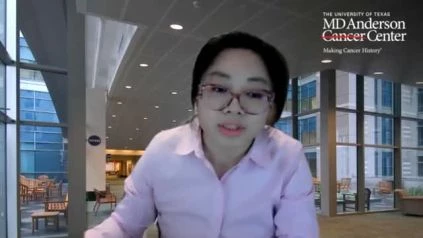Linghua Wang, MD, PhD of MD Anderson speaks about Single-cell Analysis Of Metastatic Gastric Cancer Finds Diverse Tumor Cell Populations Associated With Patient Outcomes.
Link to Article:
https://www.mdanderson.org/newsroom/gastric-cancer-study-finds-diverse-tumor-cell-populations-linked-with-outcomes.h00-159457689.html
Researchers from The University of Texas MD Anderson Cancer Center profiled over 45,000 individual cells from patients with peritoneal carcinomatosis (PC), a form of metastatic gastric cancer, and discovered two distinct subtypes that were linked to patient survival.
The researchers created and validated a gene expression signature capable of forecasting patient survival better than other clinical features based on their results, which were published today in Nature Medicine. This tool may be helpful in stratifying patients with gastric cancer and leading them to more successful clinical options if it is tested in prospective trials.
“In order to better treat patients with PC, we first have to understand the populations of metastatic cells in the peritoneal cavity,†said co-corresponding author Linghua Wang, M.D., Ph.D., assistant professor of Genomic Medicine. “This is the most detailed analysis of these cells performed to date. That is the power of single-cell analysis – we are able to look at every single cell and get a picture of the landscape.â€
Cancer cells penetrate and enter the peritoneal, or intestinal, cavity, adhering to the stomach and other tissues, causing peritoneal carcinomatosis. This can happen for other gastrointestinal cancers, but it’s more frequent with patients with advanced gastric cancers, with around 45 percent of patients developing PC. Patients have an average mortality rate of less than six months as a result of the disease, which causes substantial fluid retention in the abdominal cavity.
“PC represents a major unmet clinical need, as we don’t have effective treatment options available for these patients,†said co-corresponding author Jaffer Ajani, M.D., professor of Gastrointestinal Medical Oncology. “Based on our findings, we need to move toward profiling these cells in each patient in order to offer more tailored treatment options.â€
The researchers were also able to identify the origins of the PC cells, which is known as tumor cell lineage, using the gene expression data. They found that, although these were all gastric cancer cells, some seemed to come from stomach cells and some seemed to come from intestine cells.
“The intriguing aspect is that, by classifying tumor cells based on lineage compositions, we noted two groups of patients,†Wang said. “The more gastric-like PC cells had an aggressive phenotype and were associated with shorter survival. However, the more intestine-like PC cells were less aggressive, and patients had longer survival.â€
The researchers used these results to create a gene signature that reliably predicted patient survival better than different clinical features. They used a second cohort of patients with advanced gastric cancer and PC, as well as four large-scale localized gastric cancer cohorts representing over 1,300 patients, to confirm the signature.
The researchers aim to confirm the signature in future experiments and conduct further tests of PC cells in more patients to find regulatory pathways of tumor cell lineage plasticity and novel therapeutic targets that can be targeted to improve patient care options.
“This is an important first step toward a better understanding of the single-cell biology of these cancer cells, but we have more work to do,†Ajani said. “We foresee that understanding this heterogeneity could one day be used to guide clinical decision making that is most beneficial to each patient.â€
In addition to Wang and Ajani, collaborating MD Anderson authors include: Ruiping Wang, Ph.D., Minghao Dang, Ph.D., Guangchun Han, Ph.D., Shaojun Zhang, Ph.D., Dapeng Hao, Ph.D., Shuangtao Zhao, Ph.D., Yuanxin Wang, Xingzhi Song, Ph.D., Yanshuo Chu, Ph.D., Jianhua Zhang, Ph.D. and Andy Futreal, Ph.D., all of Genomic Medicine; Kazuto Harada, M.D., Ph.D., Melissa Pool Pizzi, Meina Zhao, Ph.D., Ghia Tatlonghari, Mariela Blum Murphy, M.D., Namita Shanbhag, Ahmed Adel Fouad Abdelhakeem, M.D., and Shumei Song, M.D., Ph.D., all of Gastrointestinal Medical Oncology; Fang Wang, Ph.D., of Bioinformatics and Computational Biology; Yang Lu, M.D., Ph.D., of Nuclear Medicine; Brian D. Badgwell, M.D., of Surgical Oncology; Jeannelyn S. Estrella, M.D., and Sinchita Roy-Chowdhuri, MBBS, Ph.D., both of Pathology; Guang Peng, Ph.D., and Samir Hanash, M.D., Ph.D., both of Clinical Cancer Prevention; George A. Calin, M.D., Ph.D., of Experimental Therapeutics; and Alexander J. Lazar, M.D., Ph.D., of Pathology and Translational Molecular Pathology. Also collaborating on the study was Mingyao Li, University of Pennsylvania School of Medicine, Philadelphia, PA. All authors declare no conflicts of interest.

